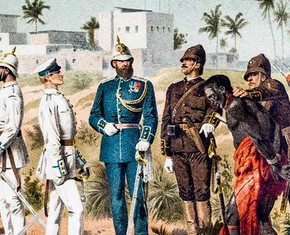The views expressed in our content reflect individual perspectives and do not represent the authoritative views of the Baha'i Faith.
Despite the contraction of the world into a virtual neighborhood, populism and nationalism have seemingly had a recent resurgence. What explains those trends?
One explanation comes from a 1997 book called The Fourth Turning: An American Prophecy, written by Neil Howe and the late William Strauss. The rise of populism and nationalism over the last few years has created a discourse based on the book’s prophetic foreboding. Its argument goes something like this: The collapse of Judeo-Christian values, the economic meltdown of 2008, and the persistent political dysfunction which have wreaked havoc on the very fabric of American society are all manifestations of a cycle of crisis, decline, and renewal foreseen by the authors—who recommend opposing multiculturalism and globalization, and returning to the core values of nationalism and the evangelical tradition.
The fundamental concept of the book revolves around the idea that history moves forward in cycles that are analogous to seasons of time and life. Based on this premise, Howe and Strauss posit an 80 or 90-year cyclical pattern of change precipitated by deep socio-economic, political and cultural crisis throughout American history. According to the authors, we can see these patterns of crisis and change through the effects of the Revolution of 1688 in Colonial America, the American Revolution (1774-1794), the Civil War (1860-65), and the Great Depression and the Second World War (1929-45). They conclude that America is now at the halfway point of what they call “the Fourth Turning”—the next stage of the country’s historical development.
This hypothesis—that patterns of socio-cultural change and the recurrence of traits in a massive process of cultural transformation happen in a cyclical way—seems to go along with well-established works of cyclical theorists like Sorokin, Spengler, Danilevsky, Schweitzer, Schubart, Berdyaev, Northrup, Toynbee and Kroeber.
All of these noted historians sought to explain that a historical synthesis towards which philosophers and scientists throughout the centuries have expressed their vision is now at long last within reach of humanity. They all agreed that as one form of culture and society declines, a new order inevitably emerges.
Works of this nature fall within the bounds of the philosophy of history. As such, they are involved with questions about highly subjective topics such as metaphysics, hermeneutics, epistemology, and historicism. They can provide useful insight into the grand scheme of things.
But even though Howe and Strauss invoked the phrase, An American “Prophecy” in their title, the book should not be interpreted as some crystal-gazing or fortune telling. The authors use extensive data and historical evidence to speculate about potential scenarios for the future. Prediction about the future, however, is not an exact science. In general, ideas regarding the historical pattern of sociocultural change are supported by a combination of empirical facts, intuition, and mental configuration. At best, they merely portray a plausible course of events—not a prophecy.
Furthermore, the authors of The Fourth Turning only consider the American script, and fail to recognize the structural anomalies of the other sectors and compartments of the existing global order. The destiny of America and the world are intimately connected—as the Baha’i teachings point out, the world no longer has independent nations, because we are all interdependent:
… all the members of the human family, whether peoples or governments, cities or villages, have become increasingly interdependent. For none is self-sufficiency any longer possible, inasmuch as political ties unite all peoples and nations, and the bonds of trade and industry, of agriculture and education, are being strengthened every day. – Abdu’l-Baha, Selections from the Writings of Abdu’l-Baha, p. 31-32.
So if the Howe/Strauss prophecy comes true, and America experiences a catastrophic “Fourth Turning,” nationalism cannot serve as the solution for the unraveling of any particular country’s society. In fact, as history has shown us, inward-looking policies based on separatism, division, isolation, and an us-versus-them mentality would only precipitate further decline. As indicated in The Fourth Turning, the First World War, the cycle of the Great Depression, and the Second World War did not deter America from recognizing the world’s growing interdependence. Actually, that recognition and the global policies it engendered helped the American democracy persevere and international organizations for collective security to emerge.
Certainly, though, as many historians have discovered, history does proceed in cycles. The Baha’i teachings identify those cyclical changes with the appearance of divine messengers—the prophets of God—who not only bring new religious teachings to humanity, but who also usher in entirely new ways of thinking:
In this present cycle there will be an evolution in civilization unparalleled in the history of the world. The world of humanity has, heretofore, been in the stage of infancy; now it is approaching maturity. Just as the individual human organism, having attained the period of maturity, reaches its fullest degree of physical strength and ripened intellectual faculties so that in one year of this ripened period there is witnessed an unprecedented measure of development, likewise the world of humanity in this cycle of its completeness and consummation will realize an immeasurable upward progress, and that power of accomplishment whereof each individual human reality is the depository of God—that outworking Universal Spirit—like the intellectual faculty, will reveal itself in infinite degrees of perfection. – Abdu’l-Baha, The Promulgation of Universal Peace, pp. 37-38.
This analysis shows that the rise of isolationism and nationalism is not an end in itself—that in fact, isolationism and nationalism are inherently antithetical to the exigencies of the current rhythm of history. Those transient behavioral patterns belong to bygone seasons. If we return to them out of nostalgia for a simpler time, they could still cause a deep crisis—but ultimately, they will serve to usher in the birth of altruistic behaviors in international relations and geopolitics. Alternatively, we may be able to preempt the severity of that potential crisis and pave a peaceful path for a better America and a better world, if we adopt policies and practices that recognize and celebrate human oneness.
The Universal House of Justice, the international governing council of the Baha’i Faith, wrote:
For many decades following the second great war of the twentieth century, humanity moved, with fits and starts, toward the promise of a united world. The failure to complete the project of the unification of nations, however, left gaps in relations in which supranational problems could fester and threaten the security and well-being of peoples and states, leading to a recrudescence of prejudice, of divers expressions of factionalism, and of virulent nationalism that are the very negation of Baha’u’llah’s message of peace and oneness. – The Universal House of Justice, letter to an individual Baha’i, 27 April 2017.
In another message, they further elaborated on the distinction between nationalism and legitimate patriotism:
Unbridled nationalism, as distinguished from a sane and legitimate patriotism, must give way to a wider loyalty, to the love of humanity as a whole. Baha’u’llah’s statement is: “The earth is but one country, and mankind its citizens.” The concept of world citizenship is a direct result of the contraction of the world into a single neighborhood through scientific advances and of the indisputable interdependence of nations. Love of all the world’s peoples does not exclude love of one’s country. The advantage of the part in a world society is best served by promoting the advantage of the whole. – The Universal House of Justice, The Promise of World Peace, p. 3.
So from a Baha’i perspective, not only the United States but the world itself must undergo a great turning—from a disconnected cacophony of conflictive countries to a united, peaceful and harmonious world.
You May Also Like
Comments

















(Compilations, Baha'i Prayers, p. 203)